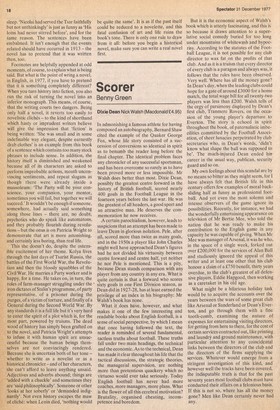Scorer
Benny Green
Dixie Dean Nick Walsh (Macdonald £4.95) In admonishing a famous athlete for having composed an autobiography, Bernard Shaw cited the example of the Quaker George Fox, whose life story consisted of a succession of conversions so identical in spirit as to benumb the reader long before the final chapter. The identical problem faces any chronicler of any successful sportsman, and has been overcome so rarely as to have been proved more or less impossible. Mr Walsh does better than most. Dixie Dean, possibly the greatest centre forward in the history of British football, scored nearly 400 goals in the Football League in the fourteen years before the last war. He was the greatest of all headers, a good sport and an attractive man. He deserves the commemoration he now receives.
.A certain parochialism, however, leads to suspicions that an attempt has been made to leave Dean in glorious isolation. Fele, after all, scored more than twice as many goals, and in the 1950s a player like John Charles might well have approached Dean's figures had he not divided his virtuosity between centre forward and centre half, yet neither he nor Pele is mentioned. This is a pity, because .Dean stands comparison with any player from any country in any era. What is quite certain is that a forward who scores sixty goals in one First Division season, as Dean did in 1927-28, has at least earned the privilege of an index in his biography: Mr Walsh's book has none.
What it does have, however, and what makes it one of the few interesting and readable books about English football, is a sense of social perspective, by which I mean that once having followed the text, the reader is reminded of several fundamental, tactless truths about football. These truths fall under two main headings, the technical and the economic. As to the technical, Dean has made it clear throughout his life that the tactical discussions, the strategic theories, the managerial supervision, are nothing more than pretentious quackery which no virtuoso would ever take seriously. Today English football has never had more coaches, more managers, more plans. What is the flower of all this cerebral motivation? Brutality, organised cheating, incompetence and boredom. But it is the economic aspect of Walsh's book which is utterly fascinating, and this is so because it draws attention to a super lative social comedy buried for too long under mountains of whitewash and hypoc risy. According to the statutes of the Football League, it is not possible for any club director to wax fat on the profits of that club. And as it is a truism that every director of every club is a paragon and always was, it follows that the rules have been observed. Very well. Where has all the money gone? In Dean's day, when the leading clubs could hope for a gate of around £3000 for a home match, the total wage bill for all twenty-two players was less than £200. Walsh tells of the orgy of parsimony displayed by Dean's first club, Tranmere Rovers, on the occasion of the young player's departure to Everton. The story is echoed in spirit throughout the book, of paternalistic imbe cilities committed by the Football Association, of sheer lunacies perpetrated by club secretaries who, in Dean's words, 'didn't know what shape the ball was supposed to be'. The much-injured Dean ended his career in the usual way, publican, security guard and so on.
My own feelings about this scandal are by no means so bitter as they might seem, for I have always felt that British life in this century offers few examples of moral backsliding half as funny as professional football. And yet even the most solemn and intense observers of the game ignore its possibilities. Recently, for instance, we had the wonderfully entertaining appearance on television of Mr Bertie Mee, who told the nation that he was ready to make his contribution to the English game in any capacity he was capable of giving. When Mr Mee was manager of Arsenal, it was he who, in the space of a single week, forked out over £200,000 for the services of Alan Ball and studiously ignored the appeal of this writer and at least one other that his club honour a claim of a £750 benefit, thirty years overdue, to the club's greatest of all defensive players, Eddie Hapgood, then working as a caretaker in his old age.
What might be a hilarious holiday task would be to acquire the accounts over the years between the wars of some great club like Arsenal or Sunderland or Dean's Everton, and go through them with a fine tooth-comb, examining the nature of expenses for entertaining visiting directors, for getting from here to there, for the cost of certain services contracted out, like printing and laundry and ground maintenance, with particular attention to any coincidental links between the directors of the club and the directors of the firms supplying the services. Whatever would emerge from a stringent investigation of this kind, and however well the tracks have been covered, the indisputable truth is that for the past seventy years most football clubs must have conducted their affairs on a felonious basis. If this is not so, where has all the money gone? Men like Dean certainly never had any.






































 Previous page
Previous page